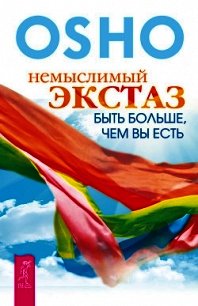Послания любви. 365 писем Ошо - Раджниш Бхагаван Шри "Ошо" (онлайн книга без .txt) 📗
Patience is a fertilizer for meditation.
Go on tending meditation,
the fruit is bound to come,
it always comes.
But, do not be anxious about the fruit.
Because such an anxiety itself becomes an obstacle for the fruit.
Because such a worry distracts the attention from meditation.
Meditation requires total attention.
To be divided won’t do.
Partiality won’t do.
Meditation is not possible without your totality.
Hence, stay with the act of meditation and leave the fruit of meditation
in the hands of the divine.
And the fruit comes.
Because drowning totally in meditation is the birth of the fruit.
159. Love.
Life is not divided, either in time or in space.
If life is anything, it is undividedness – it is an undivided flow.
Past, present, future – these are human lines drawn on the undivided
flow of time.
Indeed, they are nowhere except in the minds of men.
Mind is time.
Similarly, space is also undivided.
The body is not one’s limit – in fact, the limit or non-limit of the whole
is one’s limit.
But, the mind does not rest without dividing.
It is like a prism; to divide is its function.
Passing through it the ray of existence becomes divided into many rays
and many colors.
What is one at the root becomes many at the branches.
The root is eternal – beginningless, endless.
Branches are in time – they have their beginning, they have their end.
Branches are change.
The root is ever-lasting.
Neither the root changes nor can it be changed.
Yes – one can desire it to be changed, and then such a desire
inevitably takes one into failure and anguish.
Branches go on changing.
They cannot be stopped from changing.
But certainly it can be desired that they don’t change, and then
such a desire inevitably transforms itself into failure and anguish.
The West is in the first kind of failure and anguish.
The East is in the second kind of failure and anguish.
And so far man has not been able to give birth to such a culture
which not only succeeds but becomes fulfilled too.
The two realities I have talked about above – the reality of the root
and the reality of the branches; the law of the intransient
and the law of the transient – it is only in the harmonious balance
of these two that such a culture can be born
which will neither be polar nor lopsided,
which will use the tension of the opposite poles, the same
as architecture
uses opposing bricks in creation of an arched door.
The truth of life is pluralism.
And, the stream of life always flows taking the opposite poles
as its banks.
160. Love.
We just do not know life, that is why we get bored.
We make life mechanical, that is why we get bored.
We are not living life, we only drag along with it, that is why we get bored.
Boredom is not in life, rather it comes out of our fear of living.
We are not only afraid of death – we are afraid of life as well.
In fact, we fear death because we fear life.
Otherwise, death is not the end of life – it is the completion of life.
This is why I say: live – live fearlessly.
Let go of the past: man goes on carrying it because of fear.
And do not invite dreams of the future, because in order to avoid living today
man plans for living in the future.
Live today, and now, and here.
‘Tomorrow’ is a deception –
the ‘tomorrow’ that has passed as yesterday, as well as the tomorrow
that is yet to come.
Only this moment is.
Only this moment is eternal.
161. Love.
Life is a mystery.
It can be lived.
It can also be known by living it.
But it cannot be solved like a mathematical problem.
It is not a problem – it is a challenge.
It is not a question – it is an adventure.
Hence, those who only go on asking questions about life remain,
by this action, deprived of the answer forever.
Or acquire answers which are not answers at all.
It is such answers that one acquires from scriptures.
In fact, an answer acquired from any other source
cannot be an answer.
Because the truth of life cannot be borrowed.
Or such questioners fabricate answers of their own;
thus they certainly gain consolation, but not solutions.
Because fabricated answers are not answers.
Only the experience can be an answer.
Hence, I say: do not ask – live and know.
This is the difference between philosophy and religion.
To ask is philosophy, to live is religiousness.
And, the interesting thing is that philosophy asks but never gets the answer,
and religion does not ask at all and yet attains the answer.
162. Love.
Society is only a collectivity of individuals.
Hence, finally and essentially, it is a reflection of the minds
of the individuals.
If the individual mind is without peace, the society cannot be at peace.
Only a radical transformation of the individual mind can become the peace
of the society.
There is no other alternative.
Nor is there any shortcut.
The technique for individual transformation is meditation.
With more and more people moving into meditation; only then
is something possible.
To take shelter in the divine is the only way.
1971
163. Love.
You ask for the way to make the invisible visible?
Pay attention to the visible.
Do not just see, pay attention.
It means, when you see a flower,
let your whole being become the eye.
When you listen to the birds, let your entire body-soul become the ear.
When you look at a flower, do not think.
When you listen to birds, do not ponder.
Let the total consciousness
either see or hear or smell or taste or touch.
Because it is due to a shallowness of sensitivity that the invisible is unable
to become visible,
and the unknown remains unknown.
Deepen the sensitivity. Do not just swim in sensitivity, drown in it.
This I call meditation.
And, in meditation, the seen disappears
and finally the seer too. There remains only the seeing.
It is in this seeing that the invisible becomes visible
and the unknown becomes known.
Not only this – even the unknowable becomes knowable.
And remember that whatever I am writing –
do not start thinking about this as well: act.
Nothing has ever been nor can be attained
by creating theories.
There is no other door except ‘seeing for oneself’.
164. Love.
You ask: how far is the destination?
Ah! The destination is very far, and very near too.
And the distance or the nearness of the destination
is not dependent on the destination but upon you yourself.
The deeper the will, the nearer the destination.
If the will is total, then you yourself are the destination.
165. Love.
The word is not the thing –
the word God is not God.
But the mind goes on accumulating words and
words and words,
and then the words become the barrier.
See this as a fact with you:
can you see anything without the word?
Can you feel anything without the word?
Can you live even for a single moment without the word?
Do not think but see
and then you will be in meditation.
To exist wordlessly is to be in meditation.


